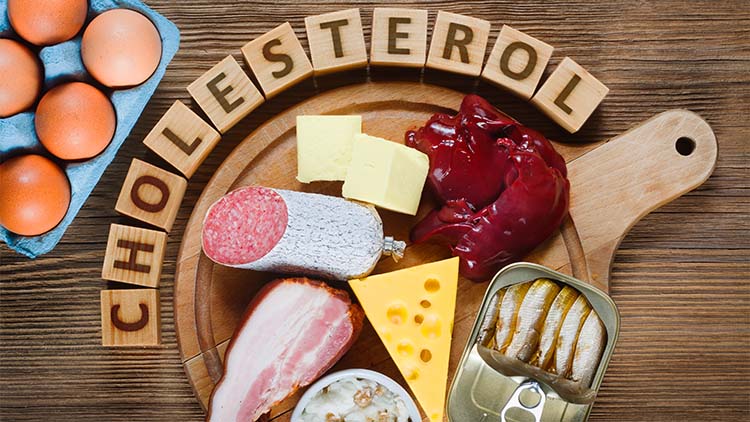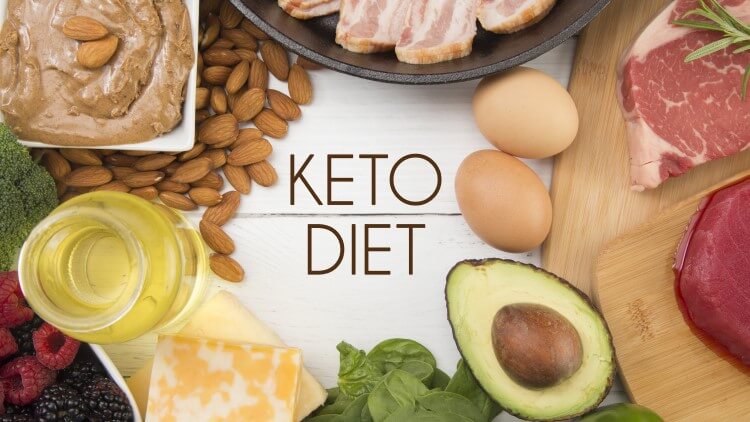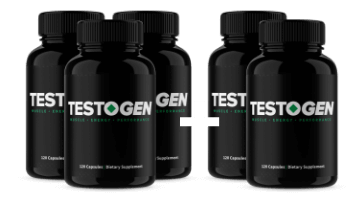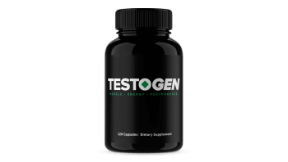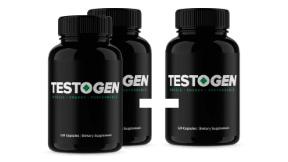When you hear cholesterol what’s the first thing that comes to mind?
Maybe you think of the difference between good and bad cholesterol levels. Or how it can cause fat buildup or increase the risk of cardiovascular disease. But cholesterol and testosterone?
Probably not. Yet the two are closely linked, in both good and bad ways…
You see, cholesterol helps the biosynthesis of testosterone, which is great. But high testosterone levels may affect your high-density lipoprotein (HDL C) levels, which you don’t want (and I’ll explain why in a bit).
And those are just two of many ways in which testosterone and cholesterol are linked.
In the short post below, you’ll find out all you need to know about your T-levels and cholesterol. Let’s go!
What is cholesterol?
Cholesterol and testosterone
How does diet affect cholesterol and testosterone?
Other ways to boost testosterone
What is cholesterol?
Cholesterol (C) is a fatty substance that’s found in your bloodstream.
Although some foods can raise your cholesterol levels, most of the cholesterol in your body (around 80%) is made in your liver. This happens during a 37-step synthesizing process.
Cholesterol is a type of lipid; or blood fat. More specifically, cholesterol is a type of lipid called a sterol, also known as a steroid alcohol.
Wait, so is cholesterol a steroid?
Yes, it is a steroid. In fact, cholesterol is the most common steroid in your body! It is also the precursor for steroid hormones in your body (including testosterone, but more on that later).
And this is just one of the vital functions of cholesterol…
Functions of cholesterol
Despite the demonization of cholesterol in recent years, we need cholesterol for many bodily functions. These include:
- Membrane creation – cholesterol is a key structural component of cell membranes in animals. It both builds and maintains healthy membranes.
- Cell signaling – it allows cells to communicate, ensuring proper function of the body.
- Brain function – it’s highly involved in many of the functions and processes of the brain.
- Bile salt composition – it makes bile acid, which helps your body break down fats you consume and improve digestion.
- Hormone production – cholesterol functions as a precursor in the production and maintenance of hormones, including testosterone. More about this further below.
And these are just a few of the many functions of cholesterol in your body. So why does it get such a bad reputation?
To understand that you need to look at the different types of cholesterol found in your body.
Types of cholesterol
As mentioned, cholesterol is a steroid. It belongs to a particular family known as non-glyceride lipids.
Other non-glyceride lipids are:
- Sphingolipids
- Waxes
- Lipoproteins
Now the latter, lipoprotein, is important when it comes to your cholesterol.
You see, cholesterol (and a different type of blood fat called triglycerides) cannot travel through your bloodstream alone. They need help, so they get wrapped in proteins forming lipoproteins.
Now the most common lipoproteins probably sound familiar, as they are considered the two main types of cholesterol, called LDL C and HDL C.
- Low-density lipoprotein cholesterol (LDL C)
You’ll know this as ‘bad’ cholesterol. These low-density lipoproteins are high in cholesterol but low in protein.
Too much LDL C in your blood can result in a fat buildup and the development of plaques in the arterial walls, which poses a cardiovascular risk as it narrows your blood vessels and clogs the arteries.
This cardiovascular disease is called atherosclerosis, which increases the risk of stroke, heart attack, high blood pressure, and more.
Low LDL C can also be a symptom of the more severe metabolic syndrome. Metabolic syndrome is the medical term for a combined condition of obesity, high blood pressure (also known as hypertension), and diabetes.
- High-density lipoprotein cholesterol (HDL C)
You know it as ‘good’ cholesterol. HDL C is basically the opposite of LDL C.
High-density lipoprotein cholesterol contains a lot of protein and only a little bit of cholesterol. HDL C transports cholesterol back to your liver for it to be broken down. This reduces cardiovascular risk.
High levels of HDL C can be considered a mark of good health, whereas low levels of HDL C can indicate a problem. For LDL C, the opposite tends to be true.
- Total cholesterol
If you’ve ever had (or read about) a cholesterol test you probably know the term total cholesterol.
Total cholesterol (TC), sometimes called serum cholesterol, includes both HDL and LDL, as well as other forms of non-HDL C.
When you get a check, you normally receive a TC:HDL ratio, which tells you how much of your TC is ‘good’.
Cholesterol and testosterone
Now let’s look at how your cholesterol levels are linked to your testosterone levels.
Some men worry that by lowering their cholesterol levels – e.g. to reduce the risk of cardiovascular disease – they might be lowering their testosterone levels as well. So what’s the link?
Well, as mentioned, one wouldn’t be without the other.
Cholesterol is used in the last phase of testosterone production. A hormone known as luteinizing hormone triggers certain cells in your testicles to convert the cholesterol into testosterone in your scrotum.
But that’s not the only link. And here is where it gets tricky…
Some studies have reported that the use of testosterone supplements or androgens in men can decrease levels of HDL C. This would mean that men raising their T-levels, either via treatment or supplementation, might be lowering their levels of good C.
Results are inconsistent, however, and some researchers have reported no correlation between HDL levels and testosterone supplementation.
On the flip side, consuming higher levels of cholesterol has been linked to an increase in testosterone levels.
One study evaluated over 4,000 men for a year. By simply observing levels of testosterone and HDL C, it was seen that men with higher C counts had higher levels of testosterone. That said, many other potential factors could have been involved in the group that measured higher in T levels.
Another study followed nearly 300 men who struggled with Type 2 diabetes. Those who had higher levels of HDL C again tested higher for testosterone.
Honestly, the research just isn’t conclusive, which means the effect of testosterone on cholesterol levels isn’t clear. On the bright side, this at least seems to indicate that there isn’t a strong, negative correlation between the two.
Testosterone treatment or supplementation in men, therefore, is unlikely to increase cardiovascular risk by negatively affecting cholesterol levels. Likewise, reducing your C levels most likely won’t negatively impact your T levels.
How does diet affect cholesterol and testosterone?
As mentioned in the beginning, 80% of C is formed in the liver. However, you can also get it from food consumption.
Now I mentioned just now that biologists aren’t clear on the exact link between C and T, but what we do know for sure is that C creates T.
So men who don’t have to worry about their C being too high might want to try and boost their T by eating some more C. And that’s where this bit below comes in.
Can your diet boost your body’s testosterone production by eating high-cholesterol foods?
Well, there has been quite a lot of evidence to suggest that dietary consumption of cholesterol is vital for the maintenance of healthy T-levels.
One study, for example, followed a group of men over 8 weeks. These men consumed a low-fat diet, and after the testing period, their testosterone levels were measured. Those on the low-fat diet tested lower for testosterone and dihydrotestosterone.
Foods that improve testosterone production
Several foods can be useful for increasing testosterone and cholesterol production, many of them by simply providing HDL for your diet or decreasing levels of non-HDL cholesterol.
- Eggs
Eggs are the definitive, go-to food for people (who aren’t vegan) who want to increase their testosterone levels.
Eggs are a great source of cholesterol, they’re easy to make, and they’re extremely versatile. Eggs can be added to a huge number of meals and prepared in many different ways, making them great for breakfast, lunch, and dinner.
They are very rich in HDL C and can lead to a marked increase in testosterone levels. Eggs further contain saturated fat, which is also important for helping to boost T levels. As such, men can increase overall T levels by adding eggs to their diet regularly.
However, it’s important not to go overboard, as the saturated fat in eggs can be dangerous if consumed in excess.
- Fatty fish
The omega-3 fatty acids found in fish are shown to help lower LDL C and other types of non-HDL cholesterol.
Aside from that several types of fish have been shown to boost testosterone production. For example, tuna may not contain a ton of C, but it is very rich in vitamin D – a nutrient that’s involved in the production of testosterone.
Tuna is ideal for men who are bodybuilding or otherwise athletic because it’s rich in protein and great for the heart as well.
Salmon and sardines are other fatty seafood sources of both omega-3 and vitamin D that can bolster T and C production.
- Legumes and grains
Many legumes and grains can reduce non-HDL cholesterol and can free up more HDL for the production of testosterone and other hormones.
This is mostly because these foods are great sources of soluble fiber. Soluble fiber is a type of fiber that’s been shown to help lower LDL and TC while raising the percentage of HDL C.
Other ways to boost testosterone
Question: Did you read this post because you struggle with low testosterone?
You’re not the only one. Low testosterone is a problem that many men struggle with.
It can interfere with your quality of life. You might notice symptoms like:
- Lack of strength and muscle
- Fatigue and tiredness
- Sexual dysfunction and issues with libido
- Problems with emotional health – depression, anxiety, irritability
- Sleepiness and lethargy
Luckily, there are safe and natural ways to increase your testosterone levels again.
TestoGen is a highly effective natural testosterone booster that combines several healthy ingredients to provide a boost to your T levels. And in case you wonder, these ingredients won’t boost your non-HDL C levels.
The 100% natural ingredients include:
- D-aspartic acid is an important amino acid involved in the production of luteinizing hormone, one of the hormones that helps convert cholesterol into testosterone.
- Zinc is a well-known aphrodisiac and healthy zinc levels can correct some symptoms of sexual dysfunction.
- Red ginseng is another herb that’s known to be useful for boosting libido, energy, and motivation – all things that high testosterone levels can provide.
- Vitamin D, which as mentioned earlier is important for the production of testosterone.
These ingredients and many more can help to combat some of the symptoms of low testosterone. If you suffer from low testosterone, TestoGen can be the solution.
Conclusion
If you’re trying to keep your (bad) cholesterol levels low, you might be scared it’ll keep your testosterone levels low as well.
Luckily for you (and many more men out there), there doesn’t appear to be a direct correlation between the two. The research on the topic is simply inconclusive, to say the least.
Are you still not sure?
Then you can try some of the foods mentioned above to safely lower your LDL C while keeping your testosterone levels up. Another great solution is to safely boost your testosterone levels with TestoGen.
Whatever you do, at this point you don’t have to worry too much about the link between cholesterol and testosterone. Judging from the research currently available, one won’t severely impact the other.



